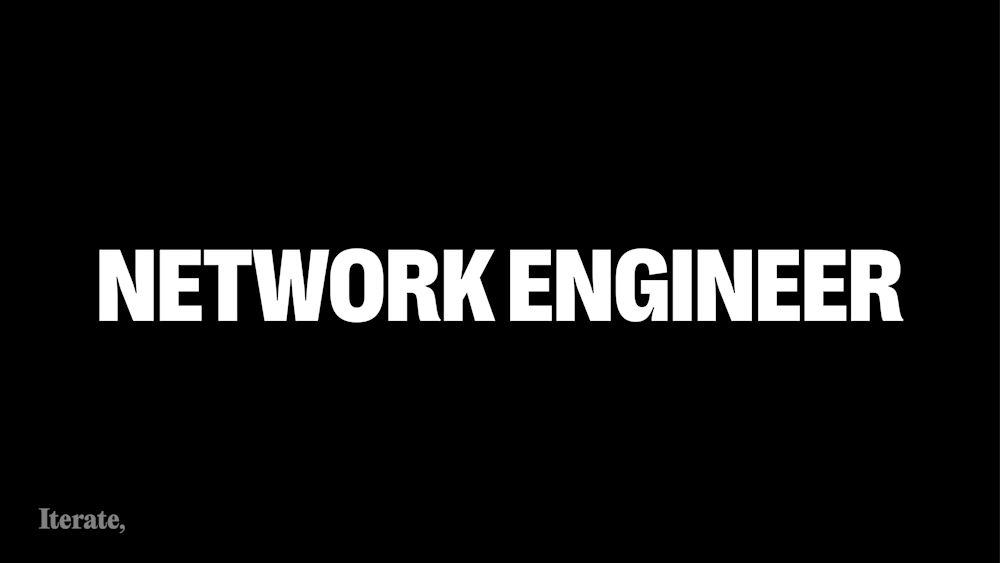Table of contents
Discover the role of network engineers and learn what their daily tasks look like, what the job requirements typically are, and how to hire the best in the field.

What is a Network Engineer?
A network engineer is a skilled professional responsible for designing, implementing, and managing computer networks. They are well-versed in network architecture, protocols, and technologies, and work to ensure that networks are efficient and reliable. Network engineers play a crucial role in establishing and maintaining connectivity between different devices, such as servers, routers, switches, and firewalls, and ensuring smooth data flow across the network.
With their in-depth knowledge of network infrastructure, protocols, and configurations, network engineers play a pivotal role in ensuring seamless communication and connectivity for businesses, organizations, and individuals in the digital age.
If you are looking for a job as a network engineer you can check out the open positions below.
How Much Does a Network Engineer Make?
The salary of a network engineer can vary greatly. However, on average, a network engineer in the United States can expect to earn an annual salary ranging from $60,000 to $120,000, with additional bonuses and benefits. Junior or entry-level network engineers may start at the lower end of the scale, while those with extensive experience, certifications, and expertise in specialized areas of networking, such as cloud computing or cybersecurity, may command higher salaries. The average network engineer salary as of 2023, according to Glassdoor, is $89,427.
It's worth noting that salaries for network engineers can also vary internationally, with different countries and regions offering different compensation packages. The highest average salaries can be found in the finance, telecommunications, and healthcare industries.
- USAA - $179,528
- NVIDIA - $175,559
- Meta - $161,646
What are the Job Responsibilities of a Network Engineer?
The job responsibilities of a network engineer are multifaceted and encompass various aspects of designing, implementing, and managing computer networks. These responsibilities include the following.
- Designing network architecture, configuring and installing network devices, such as routers, switches, and firewalls, and ensuring proper connectivity and data flow across the network.
- Performing network monitoring, troubleshooting, and performance optimization to maintain network uptime and reliability.
- Implementing network security measures, such as firewalls, VPNs, and access controls, to safeguard against potential cyber threats.
- Collaborating with other IT teams, vendors, and stakeholders to plan, implement, and upgrade network infrastructure and technologies.
- Providing technical support, documentation, and training to end-users and colleagues.
- Staying updated with the latest advancements and trends in networking to continually improve network performance and security.
Overall, network engineers play a critical role in designing, building, securing, and maintaining robust networks that enable seamless communication and data exchange within organizations and across the internet.
Meeting a Network Engineer
It’s one thing to know the requirements of a role — it’s another to see yourself in it. At The Org, we believe that putting faces to the job title can provide more context and a better sense of how the role fits into the big picture.
Explore live positions for network engineers and meet the people behind the title here.
Tips for Recruiting an Expert Network Engineer
Recruiting an expert network engineer is a big responsibility that shouldn’t be taken lightly. With the following tips, you can ensure a smooth, effective process that yields your ideal results.
- **Recruit to retain. **With the market tightening, it can be harder than ever to find the right talent. So, when beginning the recruitment process, we advise looking for candidates that will stick around for the long haul. That way, you don’t have to worry about hiring again and again.
- **Consider offering remote employment. **In today’s world, more and more people are preferring to work from home than in some heavily populated office. If possible, consider offering remote employment to open up the doors for all sorts of talent.
- **Don’t overlook “inexperienced” candidates. **Just because a person doesn’t have a degree doesn’t mean they aren’t capable of performing the role of network engineer well. In fact, years of experience and internship can prove just as valuable!
- ** Focus on post-recruitment efforts. **Now that you’ve hired your ideal candidate, you may think your job is complete–it’s not. In the end, your hire is only successful if they stay at your company. To ensure this is possible, you must ensure they have the tools and freedom needed to do their job successfully.
Recruiting a talented network engineer doesn’t have to be difficult. And with the previously listed tips, we think you’ll find it to be a smooth and educational experience.
At The Org, we believe traditional recruiting needs a refresh. Candidates want to know who they’ll work with, not just what they’ll do. Workplace culture, interpersonal relationships, and company values are more important now than ever.
And what better way to showcase your company’s unique culture than through your Org Chart?
Highlight different teams in your organization, the people that make these teams great, and show candidates how they fit into the big picture.
Your Org Chart is a novel and effective way to show candidates where they fit in and to show off your greatest asset: your people.
Explore Org Charts here, and sign up today to create your own customized Org Chart for your company.


The ORG helps
you hire great
candidates
Free to use – try today